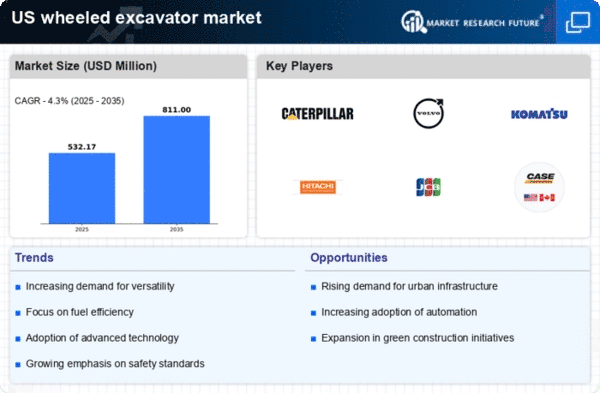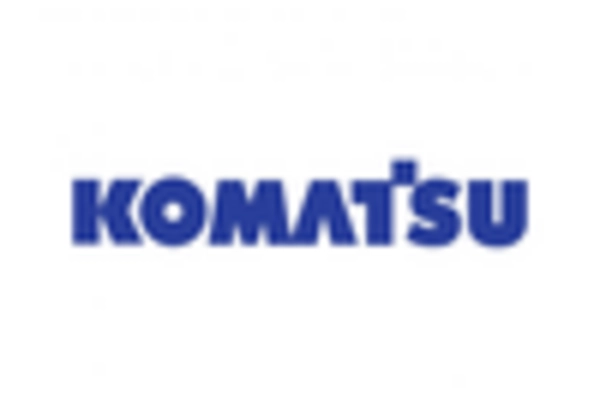Rental Market Expansion
The expansion of the equipment rental market is a notable driver for the wheeled excavator market. Many construction companies in the United States are increasingly opting to rent rather than purchase equipment, allowing for greater flexibility and cost savings. The American Rental Association reports that the equipment rental industry is expected to grow by approximately 7% annually. This trend is likely to boost the demand for wheeled excavators, as rental companies seek to expand their fleets with versatile and efficient machines. The ability to access high-quality equipment without the burden of ownership costs may further enhance the attractiveness of wheeled excavators in the rental market.
Urbanization and Construction Growth
Urbanization trends in the United States are contributing to the expansion of the wheeled excavator market. As cities grow, the demand for construction and excavation services increases, necessitating versatile equipment capable of navigating tight spaces. The U.S. Census Bureau reports that urban areas are projected to house over 80% of the population by 2050. This demographic shift is likely to drive the need for wheeled excavators, which are well-suited for urban construction projects. Additionally, the construction sector is expected to grow at a CAGR of around 5% through 2026, further indicating a robust market for wheeled excavators as they play a crucial role in meeting the demands of urban development.
Infrastructure Development Initiatives
The wheeled excavator market will benefit from ongoing infrastructure development initiatives across the United States. Government investments in transportation, utilities, and public works projects are expected to drive demand for wheeled excavators. For instance, the Federal Highway Administration has allocated approximately $350 billion for infrastructure improvements over the next five years. This funding is likely to enhance the operational landscape for construction equipment, including wheeled excavators, as they are essential for tasks such as road construction and maintenance. The increasing focus on modernizing aging infrastructure may further stimulate the wheeled excavator market, as these machines offer mobility and efficiency in urban settings.
Technological Integration in Equipment
The integration of advanced technologies in construction equipment is transforming the wheeled excavator market. Innovations such as telematics, automation, and enhanced hydraulic systems are improving operational efficiency and safety. For example, telematics systems allow for real-time monitoring of equipment performance, which can lead to reduced downtime and maintenance costs. The adoption of these technologies is likely to increase as contractors seek to optimize their operations. According to industry reports, the market for construction equipment telematics is expected to grow by over 20% annually. This trend suggests that the wheeled excavator market will increasingly incorporate these advancements, enhancing productivity and attracting new users.
Environmental Regulations and Compliance
Stringent environmental regulations aimed at reducing emissions and promoting sustainable practices influence the wheeled excavator market. The U.S. Environmental Protection Agency (EPA) has implemented regulations that require construction equipment to meet specific emissions standards. As a result, manufacturers are developing wheeled excavators that comply with these regulations, often incorporating cleaner technologies and alternative fuels. This shift not only aligns with regulatory requirements but also appeals to environmentally conscious consumers. The market for low-emission construction equipment is projected to grow significantly, indicating that compliance with environmental standards will be a key driver for the wheeled excavator market.
















